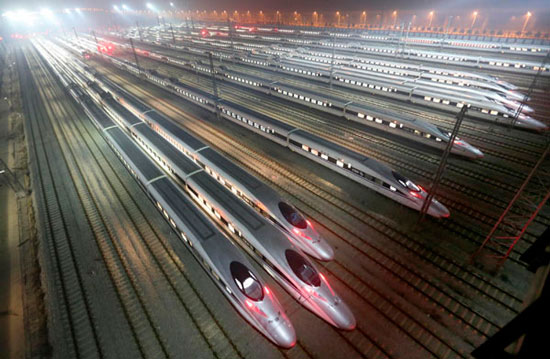
 |
| Photo taken on Dec 25 shows trains in Wuhan, Central China's Hubei province get ready for the operation of the 2,298-km high-speed line connecting Beijing and Guangzhou on Wednesday. (Photo/Xinhua) |
Train speeds were slowed from 350 km/h to 300 km/h and most projects were suspended.
The opening of the Beijing-Guangzhou line was pushed back by a year.
Wang Mengshu, deputy chief engineer at China Railway Tunnel Group, said the situation now is much better.
Many suspended projects have resumed construction, such as the link between Xi'an and Chengdu, he said.
The Ministry of Railways has also secured next year's investment of 600 billion yuan ($96 billion) for rail infrastructure, he said.
But some projects are still suspended, such as the Zhengzhou-Chongqing and Beijing-Zhangjiakou lines, he added.
"High-speed rail construction needs government funding. The loans the ministry borrowed have accumulated to nearly 4 trillion yuan so far, and each year the ministry needs to pay 80 billion yuan in interest", he said.
Besides the construction, Zhao said he believes high-speed trains could again hit speeds of 350 km/h in the future.
But he stressed that safety is the biggest priority and this could even mean reducing speed on some lines.
Trains that run at 200 km/h on the Harbin-Dalian railway in freezing temperatures could be slowed to 120 km/h or slower, if necessary. "Even suspending operations on that line is possible," he said.
Zhou Li, head of the ministry's science and technology department, said that the ministry has developed a full range of effective measures to manage safety.















 11 Chinese children dead after van plunges into pond
11 Chinese children dead after van plunges into pond


![]()
